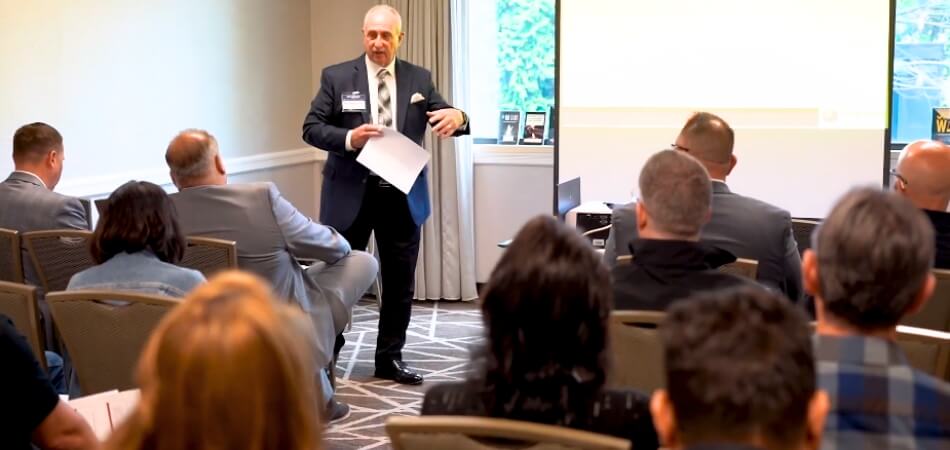Conferences are dynamic events that bring together students, professionals, and experts to share insights and ideas. For undergraduates, attending can open doors to unique learning experiences and networking opportunities. As college life grows more competitive, many students wonder, “Should undergrads attend conferences?”
Yes, undergrads should attend conferences. Conferences offer valuable networking opportunities, expose students to current research, help develop essential skills, provide inspiration, and aid in career exploration—all of which improve both academic and professional growth.
Read the content in which we talk about how conferences can be beneficial for undergraduates. This discussion will explore why undergrads should consider attending conferences, potential drawbacks, and tips for maximizing the experience. Students can decide whether investing their time in conferences is a good investment for their future by being aware of both the pros and cons.
Opportunities for Academic and Professional Growth At Conference
Attending conferences provides valuable opportunities for both academic and professional growth. These events act as platforms where people from various backgrounds can share knowledge, explore innovative ideas, and establish important connections. Whether you are a student, researcher, or professional, the benefits of attending a professional conference can be crucial in advancing your career and broadening your perspectives.
Meet with Industry Leaders and Peers
Conferences connect experts, professionals, and peers from various fields, providing attendees with unique networking opportunities. Engaging in conversations with industry leaders can open doors to new collaborations and mentorships. Building these connections can be invaluable for future career development and professional growth.
Gaining Insights from Expert Presentations
Presentations and keynote speeches by experts offer attendees the chance to learn about the latest trends, research, and innovations in their field. These sessions provide deep insights that can inspire new ideas and approaches in one’s work. Attendees often leave with a broader perspective and a better understanding of their industry.
Exploring the Latest Research and Innovations
Conferences are often the stage for presenting the latest research findings and technological advancements. Attendees can explore new tools, methodologies, and solutions that could be applied to their work or research. This exposure to the latest developments helps keep attendees at the forefront of their fields.
Developing Professional Skills through Workshops
Many conferences offer workshops and training sessions that focus on skill development and practical knowledge. These hands-on experiences allow attendees to refine their expertise and learn new techniques relevant to their professions. The skills gained from these sessions can be directly applied to improve performance in their respective fields.
Building Confidence and Presentation Skills
Presenting at a conference provides a platform to share your work and receive feedback from knowledgeable peers. This experience not only improves public speaking and presentation skills but also builds confidence in one’s abilities. The feedback received can be instrumental in refining ideas and improving future projects.
Should Undergrads Attend Conferences?
Yes, undergrads should attend conferences. Attending conferences as an undergraduate can be a fantastic opportunity to improve your academic and professional journey. Many students wonder if the time and money spent on these events are worth it. Here is what you need to know about attending conferences, what challenges you might encounter, and how you can make the most of it.
Networking Opportunities
One of the most significant advantages of attending a conference is the chance to build connections with professionals and peers in your field. Conferences attract industry leaders, researchers, and fellow students, creating an ideal environment for networking.
Imagine striking up a conversation during a coffee break with someone whose work you admire—it could lead to mentorship, internships, or even job offers down the line. These connections often become valuable resources, helping you navigate your career path and offering guidance when you need it most.
Exposure to Current Research and Trends
Conferences are hubs for the latest research and innovations in various fields. By attending presentations, workshops, and panel discussions, you gain insights into the latest topics that may not be covered in your coursework. This exposure can deepen your understanding of your chosen discipline and inspire new ideas for your projects.
Plus, you’ll have the opportunity to hear directly from experts about the challenges and advancements shaping your industry. Staying informed about current trends will not only enrich your academic knowledge but also make you more competitive in the job market.
Skill Development
Conferences often include workshops and sessions focused on developing practical skills that are essential for success in any career. If you attend a local conference or an international conference in Canada, the USA, or the UK, you might learn more about effective communication, public speaking, and other tools and techniques specific to your industry. These skills are not only beneficial for your studies but can also refine your resume.
For instance, if you participate in a workshop on presentation skills, you’ll be better prepared to deliver compelling presentations in class or during job interviews. Therefore, learning skills is one of the key benefits of attending a professional conference for any undergraduate.
Inspiration and Motivation
Attending a conference can be incredibly inspiring. Listening to passionate speakers and engaging with others who share your interests can reignite your enthusiasm for your field. You might discover new topics that spark your curiosity or encounter innovative ideas that reshape your perspective.
This inspiration can lead to new research projects, career aspirations, or a renewed commitment to your studies. Surrounding yourself with like-minded individuals who are passionate about their work can motivate you to push your boundaries and strive for excellence.
Career Exploration
Conferences provide a unique opportunity to explore different career paths and industries. You’ll meet professionals from various sectors, gaining insights into the different roles and career trajectories available. This exposure can help you clarify your own career goals and guide your academic choices.
Whether you’re looking for internships or full-time positions, talking to individuals already working in your field can provide invaluable information about what to expect and how to prepare.
Building Confidence
Taking part in a conference can be a great way to build your confidence. Engaging in discussions, asking questions, and introducing yourself to strangers may seem daunting at first, but these experiences help you develop essential interpersonal skills.
The more you practice networking and communicating in professional settings, the more comfortable you’ll become. This newfound confidence will serve you well in interviews, presentations, and future networking events.
Attending a conference as an undergraduate can be a life-changing experience. The networking opportunities, exposure to current research, skill development, inspiration, career exploration, and confidence-building experiences all contribute to a well-rounded education.
How to Make the Most of the Conference Experience as an Undergraduate?
Attending a conference can be an incredible opportunity, especially as an undergraduate. Here are some tips from my perspective to help you get the most out of your experience.
- Do Your Homework: Before the conference, take some time to research the agenda, speakers, and topics. Identify which sessions resonate with your interests or academic goals. This way, you can create a plan that ensures you attend the most valuable events.
- Set Personal Goals: Think about what you want to achieve. Are you hoping to network with certain professionals, learn about specific trends, or gather insights for a project? Setting clear goals will keep you focused and motivated throughout the event.
- Engage Actively: During the conference, don’t just sit back—get involved. Ask questions during presentations and participate in discussions. Engaging actively will not only develop your learning but also make you more memorable to others in attendance.
- Network with Intention: Conferences are fantastic for meeting people. Start conversations with fellow attendees, speakers, and exhibitors. A simple introduction can lead to meaningful connections. Remember to exchange contact information and connect on LinkedIn afterward; it’s a great way to maintain those relationships.
- Attend Social Events: Make sure to join social events, like mixers or dinners. These relaxed settings are perfect for meeting new people and can lead to fun discussions that might not happen in formal sessions.
- Follow-Up After the Conference: Once the conference wraps up, take a moment to follow up with anyone you connected with. A quick email thanking them for their insights or connecting on LinkedIn can solidify those relationships.
- Reflect on Your Experience: After the event, reflect on what you learned and how you can apply it in your studies or future career. Keeping a journal of your experiences can help you retain valuable insights.
By following these tips, you can turn your conference experience into a important moment in your academic journey. Enjoy the opportunity, and remember to have fun along the way.
Challenges Undergraduates May Face While Attending a Conference
While attending a conference can be a rewarding experience for undergraduates, it’s not without its challenges. Having a good awarness of these obstacles will help you prepare and make the most of your time at the event. Here are some common challenges you might encounter.
Financial Constraints
One of the biggest hurdles for many students is the cost associated with attending a conference. Registration fees, travel expenses, accommodation, and meals can add up quickly, creating a financial burden. Many undergraduates are on tight budgets, so it’s natural to worry about the expenses. Fortunately, some conferences offer student discounts, scholarships, or travel grants, so it’s worth researching these options before deciding whether to attend.
Time Management
Balancing academic responsibilities with conference attendance can be tricky. You may have classes, assignments, or exams that coincide with the event, making it challenging to commit fully. Missing classes can also add to your stress, especially if you’re worried about falling behind. To overcome this, it’s important to plan. Seek out conferences that fit with your academic schedule and goals. It’s a good idea to discuss your plans with professors and understand the purpose of the global conferences you’re interested in. This way, you can manage your workload more effectively.
Overwhelm and Anxiety
Stepping into a large conference venue can be overwhelming, especially for first-timers. The crowds, busy schedules, and the pressure to network can lead to anxiety. You might feel intimidated by the professionals and experts in attendance, questioning whether you belong there. It’s normal to feel this way, but remember that everyone at the conference shares a common interest in learning and networking. Taking a deep breath, setting small goals, and reminding yourself that it’s okay to be a beginner can help ease these feelings.
Limited Experience
As an undergraduate, you may find yourself surrounded by seasoned professionals and advanced students, which can highlight your relative inexperience. You might feel unsure about how to engage in conversations or ask insightful questions. However, this is an opportunity for growth. Instead of focusing on your lack of experience, consider approaching the event with a learning mindset. Ask questions, listen actively, and don’t be afraid to share your thoughts—your unique perspective as a student can offer fresh insights.
Basics of Networking
Networking can be daunting, especially if you’re not sure how to approach strangers or initiate conversations. You might feel nervous about introducing yourself or fear that you won’t make a memorable impression. It’s helpful to remember that many attendees are in the same boat, looking to connect and build relationships. Practicing a simple introduction or preparing a few conversation starters can make it easier. Also, take advantage of structured networking events where the environment is more conducive to meeting new people.
Information Overload
Conferences often present a wealth of information in a short amount of time. With numerous sessions, workshops, and presentations, it can be challenging to absorb everything. You may feel pressured to attend as many events as possible, leading to fatigue and confusion. To manage this, prioritize the sessions that interest you most and align with your goals. Taking notes during presentations and discussing topics with peers afterward can also help reinforce your knowledge and retention of the material.
Tips for Effective Conference Undergraduate Participation
Attending conferences can be a transformative experience for undergraduates. Taking advantage of these opportunities requires effective participation. Here are some tips to help you maximize your conference experience:
- Prepare in Advance: Research the conference agenda and speakers before attending. Identify sessions and workshops that align with your interests. This will help you plan your schedule effectively. Preparing questions in advance can also develop your engagement.
- Dress Appropriately: Choosing the right attire is important for making a positive impression. The appropriate color to wear for presenting at a conference makes you feel confident. Dressing professionally shows respect for the event and its participants. It also boosts your self-confidence during interactions.
- Engage Actively: Participate actively in sessions by asking questions and joining discussions. This engagement shows your interest and helps you learn more. Take notes to remember key points and ideas. Networking during breaks can also lead to valuable connections.
- Network Strategically: Identify key individuals you want to meet, such as speakers or professionals in your field. Introduce yourself and share your interests or research. Follow up with new contacts after the conference. Building these relationships can be beneficial for your future career.
- Reflect and Apply: After the conference, review your notes and summarize what you’ve learned. Consider applying this knowledge to your studies. Enrich your learning by sharing insights. Implementing these ideas can develop your academic and professional growth.
Frequently Asked Questions
Attending conferences as an undergraduate can be transformative. Here are some frequently asked questions (FAQs) to help you understand the benefits and logistics of attending these events.
Are Conferences Only For Graduate Students and Professionals?
No, conferences are not exclusive to graduate students and professionals. Many conferences encourage undergraduate participation and even have sessions specifically designed for them. These events are beneficial for students at all academic levels.
How Do I Prepare for A Conference?
Preparation involves researching the conference agenda and identifying key sessions and speakers of interest. Preparing questions in advance can strengthen your engagement. It’s also helpful to practice any presentations you plan to give.
Can Attending Conferences Help with Networking?
Yes, conferences are excellent networking opportunities. You can meet peers, mentors, and professionals in your field, potentially leading to research collaborations and job opportunities. Building these connections early can be advantageous for your future career.
What if I’m Nervous About Presenting at a Conference?
It’s natural to feel nervous about presenting, but it’s a valuable experience. Practice thoroughly and seek feedback from peers or mentors beforehand. Remember, presenting at a conference builds confidence and communication skills.
Are There Financial Supports Available for Undergraduates Who Want to Attend Conferences?
Many institutions and organizations offer grants or scholarships to help undergraduates attend conferences. Check with your university’s academic department or student services. External organizations also often provide financial support for students.
What Should I Do After Attending a Conference?
Reflect on what you learned and how it applies to your studies or career. Follow up with new contacts to maintain professional relationships. Sharing your experiences with peers can also reinforce your learning.
Can Attending Conferences Impact My Future Career?
Yes, attending conferences can have a significant impact on your future career. The knowledge gained, skills developed, and networks built at conferences can open doors to numerous opportunities. Engaging in these events demonstrates your commitment to professional growth.
Final Thoughts
The question of whether “Should undergrads attend conferences?” yet depends on individual goals. The benefits, such as networking, skill development, and exposure to new ideas, can significantly improve your academic journey.
While challenges like financial constraints and anxiety are real, they can be managed with proper preparation. Setting clear goals and actively engaging during the event will help you make the most of your experience.
If you have the chance to attend a conference, seize it! Take advantage of the opportunity to learn, connect, and grow—your future self will thank you for it. Enjoy every moment and make it an important milestone in your academic journey.








